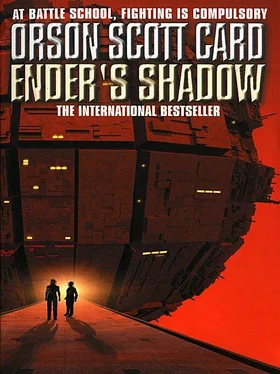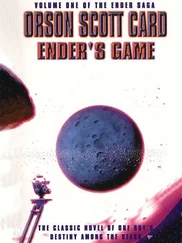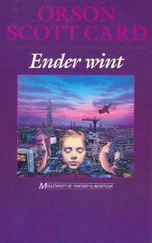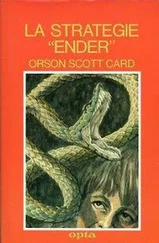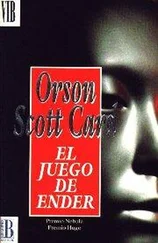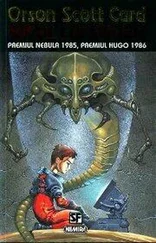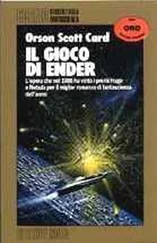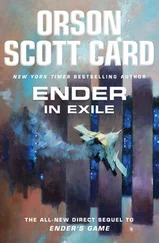Orson Card - Ender's Shadow
Здесь есть возможность читать онлайн «Orson Card - Ender's Shadow» весь текст электронной книги совершенно бесплатно (целиком полную версию без сокращений). В некоторых случаях можно слушать аудио, скачать через торрент в формате fb2 и присутствует краткое содержание. Жанр: Фантастика и фэнтези, на английском языке. Описание произведения, (предисловие) а так же отзывы посетителей доступны на портале библиотеки ЛибКат.
- Название:Ender's Shadow
- Автор:
- Жанр:
- Год:неизвестен
- ISBN:нет данных
- Рейтинг книги:4 / 5. Голосов: 1
-
Избранное:Добавить в избранное
- Отзывы:
-
Ваша оценка:
- 80
- 1
- 2
- 3
- 4
- 5
Ender's Shadow: краткое содержание, описание и аннотация
Предлагаем к чтению аннотацию, описание, краткое содержание или предисловие (зависит от того, что написал сам автор книги «Ender's Shadow»). Если вы не нашли необходимую информацию о книге — напишите в комментариях, мы постараемся отыскать её.
Ender's Shadow — читать онлайн бесплатно полную книгу (весь текст) целиком
Ниже представлен текст книги, разбитый по страницам. Система сохранения места последней прочитанной страницы, позволяет с удобством читать онлайн бесплатно книгу «Ender's Shadow», без необходимости каждый раз заново искать на чём Вы остановились. Поставьте закладку, и сможете в любой момент перейти на страницу, на которой закончили чтение.
Интервал:
Закладка:
What Bean saw as the driving force of history, however, was the resurgent Russian Empire. Where the Chinese simply took it for granted that they were and should be the center of the universe, the Russians, led by a series of ambitious demagogues and authoritarian generals, felt that history had cheated them out of their rightful place, century after century, and it was time for that to end. So it was Russia that forced the creation of the New Warsaw Pact, bringing its effective borders back to the peak of Soviet power -- and beyond, for this time Greece was its ally, and an intimidated Turkey was neutralized. Europe was on the verge of being neutralized, the Russian dream of hegemony from the Pacific to the Atlantic at last within reach.
And then the Formics came and cut a swath of destruction through China that left a hundred million dead. Suddenly land-based armies seemed trivial, and questions of international competition were put on hold.
But that was only superficial. In fact, the Russians used their domination of the office of the Polemarch to build up a network of officers in key places throughout the fleet. Everything was in place for a vast power play the moment the Buggers were defeated -- or before, if they thought it was to their advantage. Oddly, the Russians were rather open about their intentions -- they always had been. They had no talent for subtlety, but they made up for it with amazing stubbornness. Negotiations for anything could take decades. And meanwhile, their penetration of the fleet was nearly total. Infantry forces loyal to the Strategos would be isolated, unable to get to the places where they were needed because there would be no ships to carry them.
When the war with the Buggers ended, the Russians clearly planned that within hours they would rule the fleet and therefore the world. It was their destiny. The North Americans were as complacent as ever, sure that destiny would work everything out in their favor. Only a few demagogues saw the danger. The Chinese and the Muslim world were alert to the danger, and even they were unable to make any kind of stand for fear of breaking up the alliance that made resistance to the Buggers possible.
The more he studied, the more Bean wished that he did not have to go to Tactical School. This war would belong to Ender and his friends. And while Bean loved Ender as much as any of them, and would gladly serve with them against the Buggers, the fact was that they didn't need him. It was the next war, the struggle for world domination, that fascinated him. The Russians could be stopped, if the right preparations were made.
But then he had to ask himself: Should they be stopped? A quick, bloody, but effective coup which would bring the world under a single government -- it would mean the end of war among humans, wouldn't it? And in such a climate of peace, wouldn't all nations be better off?
So, even as Bean developed his plan for stopping the Russians, he tried to evaluate what a worldwide Russian Empire would be like.
And what he concluded was that it would not last. For along with their national vigor, the Russians had also nurtured their astonishing talent for misgovernment, that sense of personal entitlement that made corruption a way of life. The institutional tradition of competence that would be essential for a successful world government was nonexistent. It was in China that those institutions and values were most vigorous. But even China would be a poor substitute for a genuine world government that transcended any national interest. The wrong world government would eventually collapse under its own weight.
Bean longed to be able to talk these things over with someone -- with Nikolai, or even with one of the teachers. It slowed him down to have his own thoughts move around in circles -- without outside stimulation it was hard to break free of his own assumptions. One mind can think only of its own questions; it rarely surprises itself. But he made progress, slowly, during that voyage, and then during the months of Tactical School.
Tactical was a blur of short voyages and detailed tours of various ships. Bean was disgusted that they seemed to concentrate entirely on older designs, which seemed pointless to him -- why train your commanders in ships they won't actually be using in battle? But the teachers treated his objection with contempt, pointing out that ships were ships, in the long run, and the newest vessels had to be put into service patrolling the perimeters of the solar system. There were none to spare for training children.
They were taught very little about the art of pilotry, for they were not being trained to fly the ships, only to command them in battle. They had to get a sense of how the weapons worked, how the ships moved, what could be expected of them, what their limitations were. Much of it was rote learning ... but that was precisely the kind of learning Bean could do almost in his sleep, being able to recall anything that he had read or heard with any degree of attention.
So throughout Tactical School, while he performed as well as anyone, his real concentration was still on the problems of the current political situation on Earth. For Tactical School was at ISL, and so the library there was constantly being updated, and not just with the material authorized for inclusion in finite ships' libraries. For the first time, Bean began to read the writings of current political thinkers on Earth. He read what was coming out of Russia, and once again was astonished at how nakedly they pursued their ambitions. The Chinese writers saw the danger, but being Chinese, made no effort to rally support in other nations for any kind of resistance.
To the Chinese, once something was known in China, it was known everywhere that mattered. And the Euro-American nations seemed dominated by a studied ignorance that to Bean appeared to be a death wish. Yet there were some who were awake, struggling to create coalitions.
Two popular commentators in particular came to Bean's attention. Demosthenes at first glance seemed to be a rabble-rouser, playing on prejudice and xenophobia. But he was also having considerable success in leading a popular movement. Bean didn't know if life under a government headed by Demosthenes would be any better than living under the Russians, but Demosthenes would at least make a contest out of it. The other commentator that Bean took note of was Locke, a lofty, high-minded fellow who nattered about world peace and forging alliances -- yet amid his apparent complacency, Locke actually seemed to be working from the same set of facts as Demosthenes, taking it for granted that the Russians were vigorous enough to "lead" the world, but unprepared to do so in a "beneficial" way. In a way, it was as if Demosthenes and Locke were doing their research together, reading all the same sources, learning from all the same correspondents, but then appealing to completely different audiences.
For a while, Bean even toyed with the possibility that Locke and Demosthenes were the same person. But no, the writing styles were different, and more importantly, they thought and analyzed differently. Bean didn't think anyone was smart enough to fake that.
Whoever they were, these two commentators were the people that seemed to see the situation most accurately, and so Bean began to conceive of his essay on strategy in the post-Formic world as a letter to both Locke and Demosthenes. A private letter. An anonymous letter. Because his observations should be known, and these two seemed to be in the best position to bring Bean's ideas to fruition.
Resorting to old habits, Bean spent some time in the library watching several officers log on to the net, and soon had six log-ins that he could use. He then wrote his letter in six parts, using a different log-in for each part, and then sent the parts to Locke and Demosthenes within minutes of each other. He did it during an hour when the library was crowded, and made sure that he himself was logged on to the net on his own desk in his barracks, ostensibly playing a game. He doubted they'd be counting his keystrokes and realize that he wasn't actually doing anything with his desk during that time. And if they did trace the letter back to him, well, too bad. In all likelihood, Locke and Demosthenes would not try to trace him -- in his letter he asked them not to. They would either believe him or not; they would agree with him or not; beyond that he could not go. He had spelled out for them exactly what the dangers were, what the Russian strategy obviously was, and what steps must be taken to ensure that the Russians did not succeed in their preemptive strike.
Читать дальшеИнтервал:
Закладка:
Похожие книги на «Ender's Shadow»
Представляем Вашему вниманию похожие книги на «Ender's Shadow» списком для выбора. Мы отобрали схожую по названию и смыслу литературу в надежде предоставить читателям больше вариантов отыскать новые, интересные, ещё непрочитанные произведения.
Обсуждение, отзывы о книге «Ender's Shadow» и просто собственные мнения читателей. Оставьте ваши комментарии, напишите, что Вы думаете о произведении, его смысле или главных героях. Укажите что конкретно понравилось, а что нет, и почему Вы так считаете.
